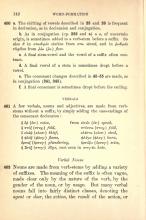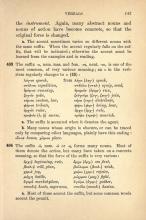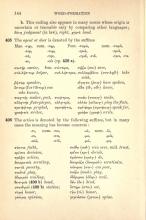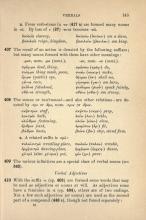402. Nouns are made from verb stems by adding a variety of suffixes. The meaning of the suffix is often vague, made clear only by the nature of the verb, by the gender of the noun, or by usage. But many verbal nouns fall into fairly distinct classes, denoting the agent or doer, the action, the result of the action, or the instrument. Again, many abstract nouns and nouns of action have become concrete, so that the original force is changed.
a. The accent sometimes varies on different nouns with the same suffix. When the accent regularly falls on the suffix, that will be indicated; otherwise the accent must be learned from the examples and in reading.
403. The suffix -ο, nominative masculine and feminine -ος, neuter -ον, is one of the most common, of very various meaning; an -ε- in the verb stem regularly changes to -ο- (§ 25).
| Noun | Verb | |
| λόγ-ος speech |
from | λέγω (λεγ-) speak |
| στόλ-ος expedition |
στέλλω (στελ-) equip, send |
|
| δρόμ-ος running course, race |
δραμεῖν (δραμ-) run |
|
| ζυγ-όν yoke |
ζεύγνῡμι (ζυγ-, ζευγ-) join |
|
| νόμ-ος custom, law |
νέμω (νεμ-) distribute |
|
| φόρ-ος tribute |
φέρω (φερ-) bring, bear |
|
| ἀρχ-ός ruler |
ἄρχω (ἀρχ) rule |
|
| τροφ-ός (ὁ, ἡ) nurse |
τρέφω (τρεφ-) nourish |
a. The suffix is accented when it denotes the agent.
b. Even nouns whose origin is obscure, or can be traced only by comparing other languages, plainly have this ending.
οἶκ-ος (ὁ) house
404. The suffix -ᾱ, nominative -ᾱ or -η, forms many nouns. Most of them denote the action, but many have taken on a concrete meaning, so that the force of the suffix is very various.
| Noun | Verb |
| ἀρχ-ή beginning, rule |
ἄρχω (ἀρχ-) am first |
| βουλ-ή will, plan |
βούλομαι (βουλ-) wish |
| χαρᾱ́- joy |
χαίρω (χαρ-) rejoice |
| μάχ-η battle |
μάχομαι (μαχ-) fight |
| ἀγορᾱ́ marketplace |
ἀγείρω (ἀγερ-) gather |
| σπουδ-ή haste, eagerness |
σπεύδω (σπευδ-) hasten |
a. Most of these accent the suffix, but some common words accent the penult.
b. This ending also appears in many nouns whose origin is uncertain or traceable only by comparing other languages.
δίκ-η (ἡ) judgment (in law), right
χώρ-ᾱ (ἡ) land
405. The agent or doer is denoted by the suffixes.
| Masculine | Feminine | ||
| Suffix | Nom. | Suffix | Nom. |
| -τηρ | -τηρ | -τειρᾱ | -τειρᾰ |
| -τορ | - τωρ | -τριᾱ | -τριᾰ |
| -τᾱ | -της | -τριδ, -τιδ | -τρις, -τις |
| -ευ | -εύς (cp. § 430.a) |
||
406. The action is denoted by the following suffixes, but in many cases the meaning has become concrete.
| Suffix | Nom. | Suffix | Nom. |
| -τι | -τις | -ιᾱ | -ίᾱ |
| -σι | -σις | -μο | -μός |
| -σιᾱ | -σίᾱ, | -μᾱ | -μη |
| Noun | Verb |
| πίσ-τις faith |
πείθω (πιθ-) win over, (mid.) trust |
| κρί-σις decision> |
κρῑ́νω (κρι-) decide |
| πρᾶξις action |
πρᾱ́σσω (πρᾱγ-) do |
| δοκιμα-σίᾱ scrutiny |
δοκιμάζω (δοκιμαδ-) scrutinize |
| πεν-ίᾱ poverty |
πένομαι (πεν-) am poor |
| παιδιᾱ́ play |
παίζω (παιδ-) play |
| ὀδυρ-μός wailing |
ὀδῡ́ρομαι (ὀδυρ-) wail |
| δε-σ-μός bοnd (§ 400.b) |
δέω (δε-) bind |
| στα-θ-μός station (§ 400.b) |
ἵστημι (στα-) set |
| τῑ-μή honor |
τῑ́ω (τῑ) honor |
| γνώ-μη opinion |
γιγνώσκω (γνο:ω-) opine |
a. From verb stems in -ευ (§ 417.a) are formed many nouns in -ιᾱ. By loss of -υ- (§ 27) -ευ-ιᾱ becomes -είᾱ.
| Noun | Verb |
| δουλείᾱ slavery |
δουλεύω (δουλευ-) am a slave |
| βασιλείᾱ reign, kingdοm |
βασιλεύω (βασιλευ-) am king |
407. The result of an action is denoted by the following suffixes; but many nouns formed with them have other meanings.
408. The means or instrument— and also other relations— are denoted by -τρο or -θρο, nominative -τρον or -θρον.
| Noun | Verb |
| σκῆπ-τρον staff |
σκήπτω (σκηπ-) prop |
| λου-τρόν bath |
λούω (λου-) bathe |
| κλεῖ-θρον fastening |
κλείω- (κλει-) close |
| ἄρ-θρον joint |
ἀραρίσκω (ἀρ-) fit |
| βά-θρον basis |
βαίνω (βα-) step, stand firm |
a. A related suffix is -τρᾱ.
| Noun | Verb |
| παλαί-σ-τρᾱ wrestling-place |
παιλαίω (παλαι-) wrestle |
| ὀρχή-σ-τρᾱ dancing-place |
ὀρχέομαι (ὀρχε:η-) dance |
| χύ-τρᾱ (also χύ-τρος) pot |
χέω (χυ-) pour |
409. The various infinitives are a special class of verbal nouns (see § 562).




